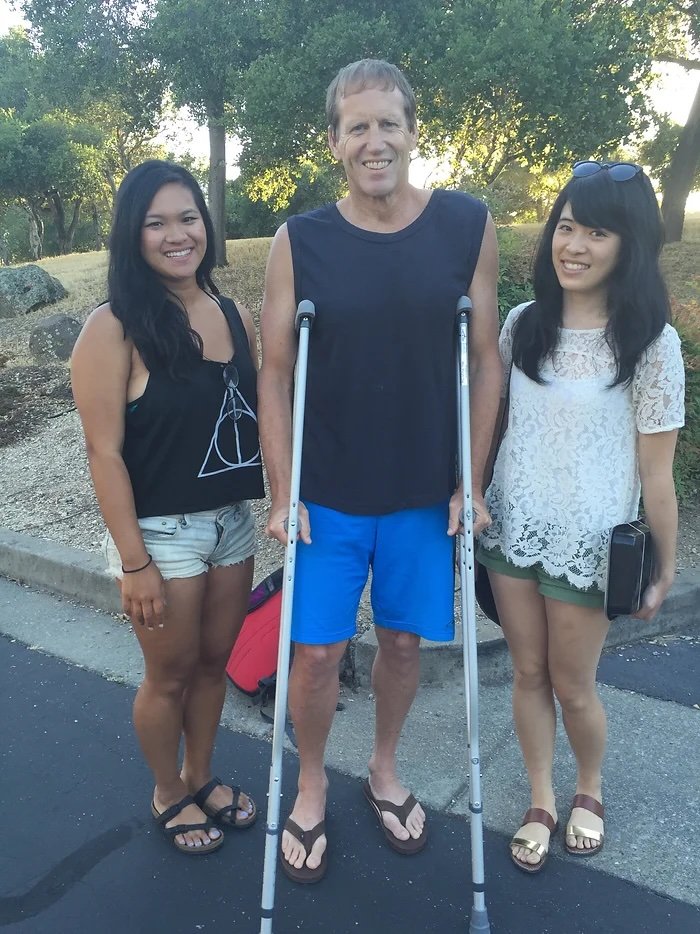From your pupils you'll be taught - four lessons from Amy
Arthur: What's the best thing for being sad? You taught me once.
Merlin: The best thing for being sad is to learn something.
Arthur: Learn something?
Merlin: It's the one thing, Wart, that never fails.
You know how Facebook sends you photos with "Your Memories"? I just got this one:
Eight years after this lovely moment with my student and TA, Amy died from the complications of a stroke.
She was 28.
Twenty-one months ago, she was loving life. She was thrilled to be a graduate student studying Education Policy at the University of Washington. During her spring break, after a long, successful downhill ski run, she collapsed at the bottom of a Utah mountain.
For 17 months, she fought hard, made progress, then relapsed and succumbed.
It's unfathomable.
Amy wanted to "reform education." She won't get to, at least not in the way she envisioned. But the lessons she left us should be included in every school everywhere - including the one being built in her honor in rural Vietnam.
Teachers aren't supposed to outlive their students. And, in a way, that didn't happen. Amy was in my class, but she taught me way more than I taught her. By watching how she lived her too short but extraordinarily impactful life, I became her student. She left me (and everyone else) with four precious lessons:
Lesson #1 There's good in the bad
During a U.S. History class that included Amy, we studied the horrific Vietnam War. Over a million people were killed, including hundreds of thousands of civilian Vietnamese men, women and children. Environments were devastated. Animals - wild and domestic - were wiped out.
My brother was drafted into the US Army and sent to Vietnam. He survived, but the 58,000 Americans whose names are inscribed on the Vietnam Memorial didn't.
During my Air Force officer training, we were asked to support or oppose the premise "War is hell; there are no benefits."
Initially, I supported it. Later, I changed my mind. There can be benefits:
War can boost the economy.
War can spur innovation.
War can free the oppressed
Whether they're worth war - worth lives lost - is another question, but history often proves that even wars have silver linings.
One of which I first thought about because of Amy. We were discussing the My Lai Massacre when Amy, who was Vietnamese, said something profound.
I can't even remember what it was. But I can remember thinking, Amy is a teacher's dream student. She listens, participates and contributes. I like her - a lot.
Then it struck me. Amy is Vietnamese. If the United States hadn't gotten involved in that ridiculous war, I would never have met her.
I know. This is outrageously selfish. I get that. But it's true. I started thinking about all the extraordinarily great kids (and adults) I've met as a result of some dreadful historical event. Over the years, the list has grown.
Without meaning to, just by being a bright, curious, compassionate person, Amy enabled me to recognize the good germinated from the bad. There's no doubt that Amy Lesson #1 helps me cope with the COVID pandemic.What good will come from it?
Lesson # 2 Connect others
Over the years, Amy connected me with others who became important people in my life.
Before learning from her, I tried to connect myself with others. She showed me that leaving myself out of the equation and connecting others is equally gratifying. It's one of my goals now - to connect as many people as I can.
Lesson #3 Fortitude
No one I've ever known is as tough as Amy was. Even before the stroke, her grit was impressive. Swimming, hiking, singing, dancing, skiing, studying, playing the piano..., she pushed past the difficult early stages on her way to mastery.
After the stroke, her fortitude while undergoing the never-ending medical procedures and enduring the exhausting rehabilitation was off the charts. It shook me.
Recently, I had a biopsy. I hate biopsies. But I know they're nothing compared to what Amy dealt with every day. So I sucked it up and told myself that I need to try to be ten percent as tough as Amy.
It worked.
Lesson #4 Inexorable positivity, gratefulness and gratitude
During a Zoom meet-up over a year after the day that upended her life, I asked Amy, "On a scale of 1-10, how happy are you right now?"
Her dreams and goals on hold, her body decimated, her mind struggling to regain its sharpness, Amy, without hesitation, answered.
"10."
Then she did hesitate a moment and continued.
"I - just - love - every - body."
Gandhi said, "My life is my message."
So was Amy's.
___________________
Please be a part of building Amy's Legacy School in rural Vietnam. The donation deadline on Facebook is January 17, 2021.
After that, you can donate to the Kefi Foundation and I'll transfer it to Amy's family fund. (Please email me to let me know your Kefi donation is "for Amy.")



